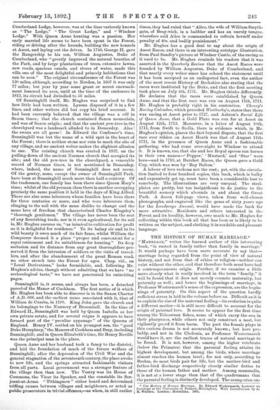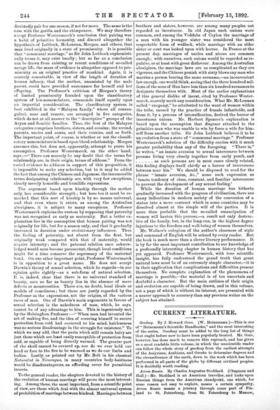THE HISTORY OF HUMAN MARRIAGE.* "MARRIAGE," writes the learned author
of this interesting book, "is rooted in family rather than family in marriage." It would perhaps have been more accurate to say that— marriage being regarded from the point of view of natural history, and not from that of ethics or religion—neither can exist without the other, and that therefore both must have had a contemporaneous origin. Further, if we examine a little more closely what is really involved in the term "family," it will be found that it does not merely connote maternity, but paternity as well ; and hence the beginnings of marriage, in Professor Westermarck's sense of the expression, are the begin- nings of paternity. On this aspect of the question hardly sufficient stress is laid in the volume before us. Difficult as it is to explain the rise of the maternal feeling—its evolution is quite a different matter—it is still more difficult to account for the origin of paternal love. It seems to appear for the first time among the Teleostean fishes, some of which carry the ova in their pharynxes, while others not only construct a nest, but vigilantly guard it from harm. The part the female plays in this carious drama is not accurately known ; but here pro- bably, and not in the Chelonia, as Professor Westermarek would have it, are the earliest traces of natural marriage to be found. It is not, however, among the higher vetebrata (below the Primates) that the parental feeling attains its highest development, but among the birds, where marriage almost reaches the human level ; for not only, according to Brehm, do most birds pair for life, but the mother-bird and father-bird discharge respectively closely similar duties to those of the human father and mother. Among mammalia, it is not at a lower stage than that of the quadrnmana that the parental feeling is distinctly developed. The orang-utan un-
• The Hidery of Human Marriage. By Edward Westermarck. Lecturer on Sociology at the University of Finland. Helsingfors. With Introduction by A. R. Wallace. London: hf.wynille” 1891. donbtedly pair for one season, if not for more. The same is the case with the gorilla and the chimpanzee. We may therefore a3capt Professor Westermarck's conclusion that pairing was a habit of primitive humanity, and discard altogether the hypothesis of Lubbock, McLennan, Morgan, and others, that man lived originally in a state of promiscuity. It is possible that " communal marriage," as Sir John Lubbock euphemisti- cally terms it, may exist locally ; but so far as a conclusion can be drawn from existing or recent conditions of so-called savage life, the mass of evidence is altogether opposed to pro- miscuity as an original practice of mankind. Again, it is scarcely conceivable, in view of the length of duration of human infancy, that the mother, unassisted by the male parent, could have provided sustenance for herself and her offspring. The Professor's criticism of Morgan's theory of limited promiscuity founded upon the classificatory system of kin-nomenclature, commends itself equally upon an impartial consideration. The classificatory system is best exhibited in the " Malayan family," where all consan- guinei, near and remote, are arranged in five categories, which do not at all answer to the " descriptive" groups of the Aryan and Semitic families. Thus, the first of the Malayan categories comprises brothers, sisters, and cousins ; the second, parents, uncles and aunts, and their cousins, and so forth. The important point, of course, is whether or not the classifi- catory nomenclature is based upon blood-relationship. Morgan assumes this, but does not, apparently, attempt to prove his assumption. Professor Westermarck, on the other hand, says :—" There can scarcely be any doubt that the terms for relationship are, in their origin, terms of address." From the va.riel evidence he widuces in support of this proposition, it is impossible to make any selection, but to it may be added the fact that among the Chinese and Japanese, the innumerable terms designating relationship are, with very few exceptions, clearly merely honorific and humilific expressions.
The argument based upon kinship through the mother only, has considerable strength ; but here too it must be re- markei that this sort of kinship is by no means universal, and that even where it exists, as among the Australian aborigines, it is subject to many exceptions. Professor Westermarck explains the custom by supposing that paternity was not recognised as early as maternity. Bat a better ex- planation lies in the assumption that human pairing was not originally for life, but for a season only, and that it gradually increased in duration under evolutionary influences. Thus the feeling of paternity, not absent from the first, but originally weak compared with that of maternity, would acquire intensity ; and the paternal relation once acknow- ledged would soon become paramount, though local conditions might for a time conserve the supremacy of the maternal bond. On one other important point, Professor Westermarck is in opposition to a great name. He does not accept Darwin's theory of sexual selection, which he regards—in our opinion quite rightly—as a sub-form of natural selection. It is, indeed, clear that there is no universal standard of beauty, save so far as beauty lies in the absence of mere defects or monstrosities. There are, no doubt, local ideals or models of comeliness ; but these are justly regarded by the Professor as the expressions, not the origins, of the various races of men. One of Darwin's main arguments in favour of sexual selection is the nakedness of man, which, he says, cannot be of any advantage to him. This is ingeniously met by the Helsingfors Professor :—" When man had invented the art of making fire, and the idea of covering himself to secure protection from cold had occurred to his mind, hairlessness was no serious disadvantage in the struggle for existence." To which we may add, that the parts which still remain hairy are just those which are least easily susceptible of protection from cold, or capable of being directly warmed. The greater part of the skull cannot be covered up, nor do we ever hold our head or face to the fire to be warmed as we do our limbs and bodies. Lastly, as pointed out by Mr. Belt in his classical Naturalist in Nicaragua, in many countries body-hairiness would be disadvantageous, as affording cover for parasitical insects.
To the general reader, the ohapters devoted to the history of the evolution of human marriage will prove the most interest- ing. Among these, the most important, from a scientific point of view, are those which deal with the almost universal system of prohibition of marriage between kindred. Marriages between brothers and sisters, however, are among many peoples not regarded as incestuous. In old Japan such unions were common, and among the Veddahs of Ceylon the marriage of a man with his younger sister was considered the most respectable form of wedlock, while marriage with an elder sister or aunt was looked upon with horror. In France at the present day, marriages of uncles and nieces are common enough; with ourselves, such unions would be regarded as re- pulsive, or at least with great disfavour. Among the Australian aborigines, the marriage laws are as complicated as they are vigorous, and the Chinese punish with sixty blows any man who marries a person bearing the same surname,—an inconvenient law enough, one would think, seeing that the three hundred mil- lions of the sons of Han have less than six hundred surnames to designate themselves with. Most of the earlier explanations of this general dislike of incest, cited by Professor Wester- marck, scarcely merit any consideration. What Mr. McLennan called " exogamy," he attributed to the want of women within the tribe, caused by the practice of female infanticide, and from it, by a process of intensification, derived the horror of incestuous unions. Mr. Herbert Spencer's explanation is based upon the assumption that disgrace attached to the primitive man who was unable to win by force a wife for him- self from another tribe. Sir John Lubbock believes it to be an evolution from a state of " communal marriage." Professor Westermarck's solution of the difficulty carries with it much greater probability than any of the foregoing. "There is," he writes, " an innate aversion to sexual intercourse between persons living very closely together from early youth, and
as such persons are in most cases closely related, this feeling displays itself chiefly as a horror of intercourse between near kin." We should be disposed to read for the phrase " innate aversion, 8te.," some such expression as
innate tendency of close, constant, and familiar intercourse to prevent the development of any sexual feeling.'
While the duration of human marriage has hitherto gradually increased with the progress of civilisation, there are many indications in modern society of the conversion of a status into a mere contract which in some countries may be dissolved almost at the simple will of the parties. It is more than probable that the so-called emancipation of women will hasten this process,—a result not only destruc- tive of the family, but, in the long-run, in the highest degree injurious to the freedom and well-being of women themselves.
Mr. Wallace's eulogium of the author's clearness of style and command of English will be echoed by every reader. But the book is much more than a clever literary performance. It is by far the most important contribution to our knowledge of a profoundly interesting chapter in human history that has yet appeared. Professor Westermarck, with true scientific insight, has fully understood the grand truth that great natural laws must be of an extremely simple character,—it is in their application that complications and difficulties present themselves. No complete explanation of the phenomena of marriage is possible,—the material is of too uncertain and doubtful a character. But the main outlines of their origin and evolution are capable of being drawn, and in this volume, not a page of which is without its interest, are presented with a nearer approach to accuracy than any previous writer on the subject has attained.



































 Previous page
Previous page